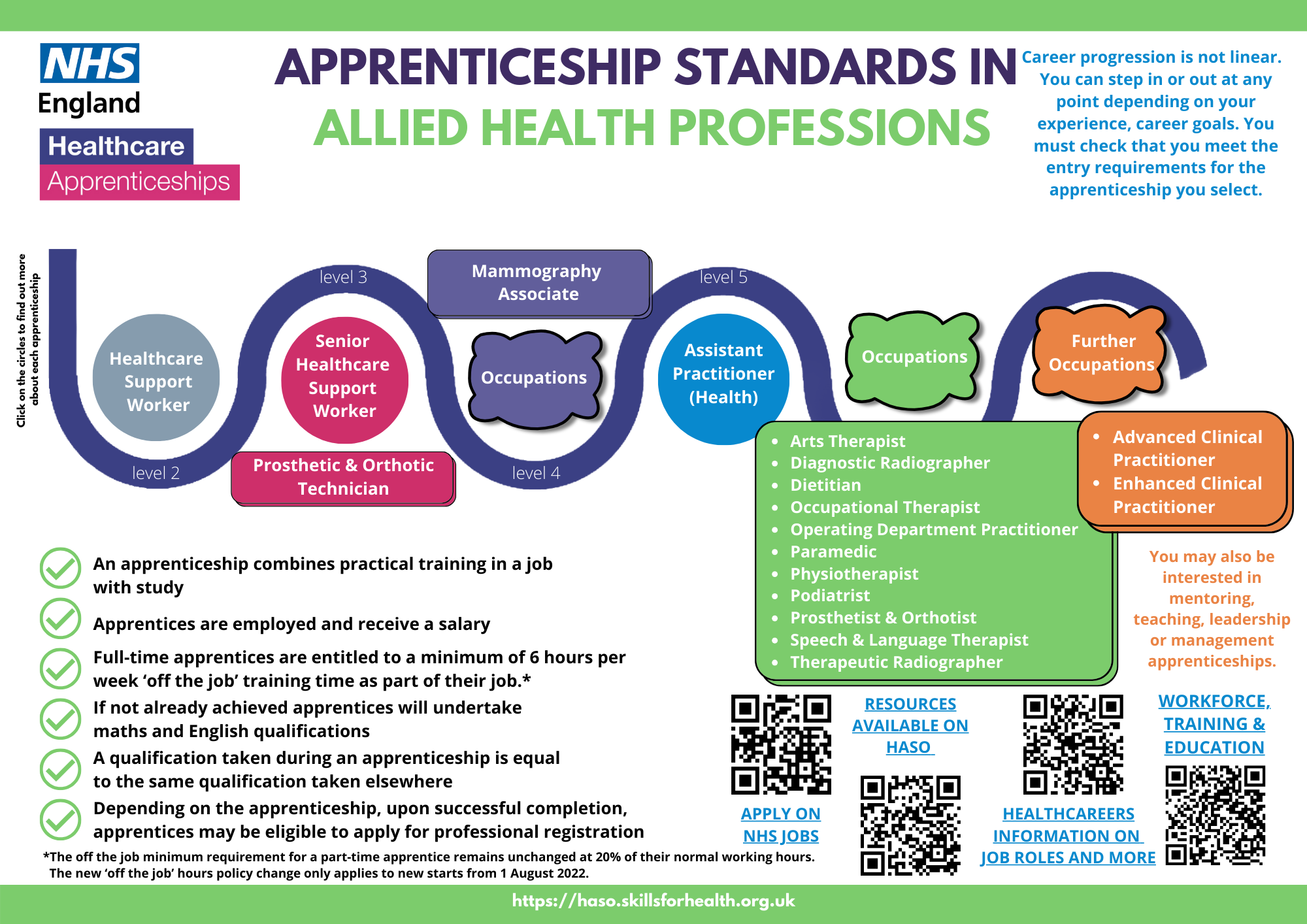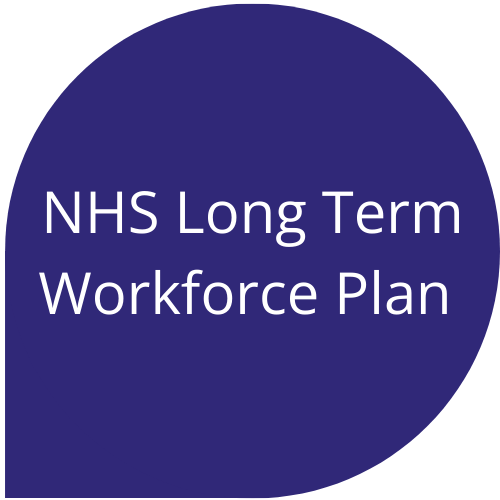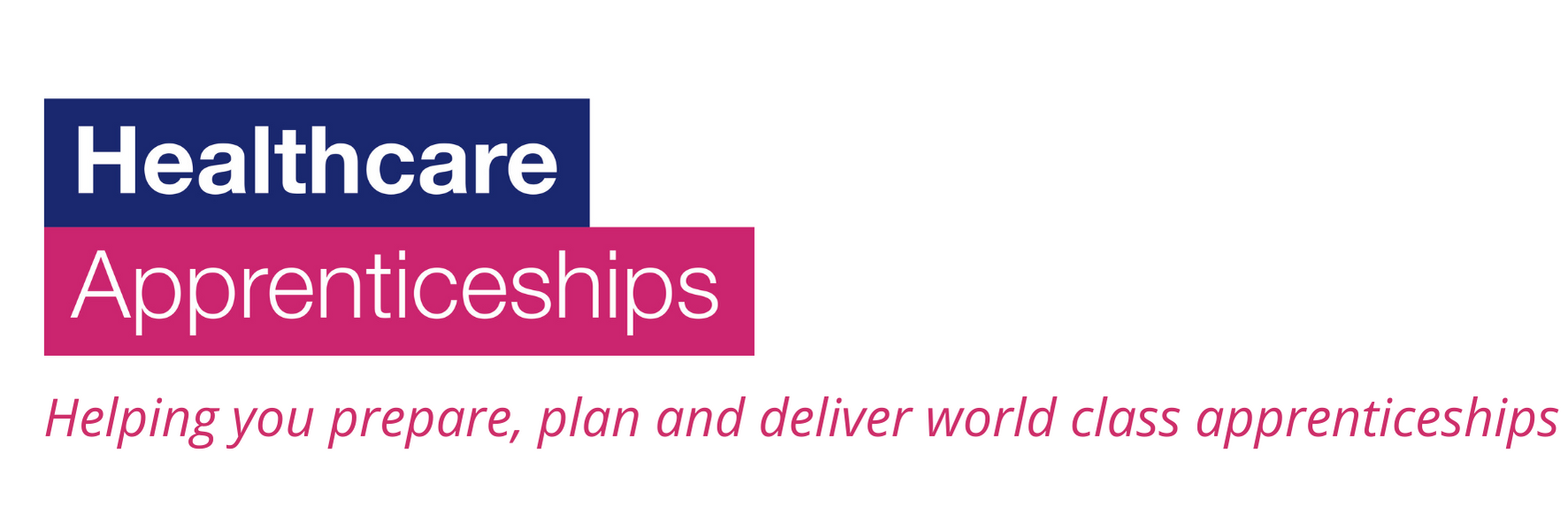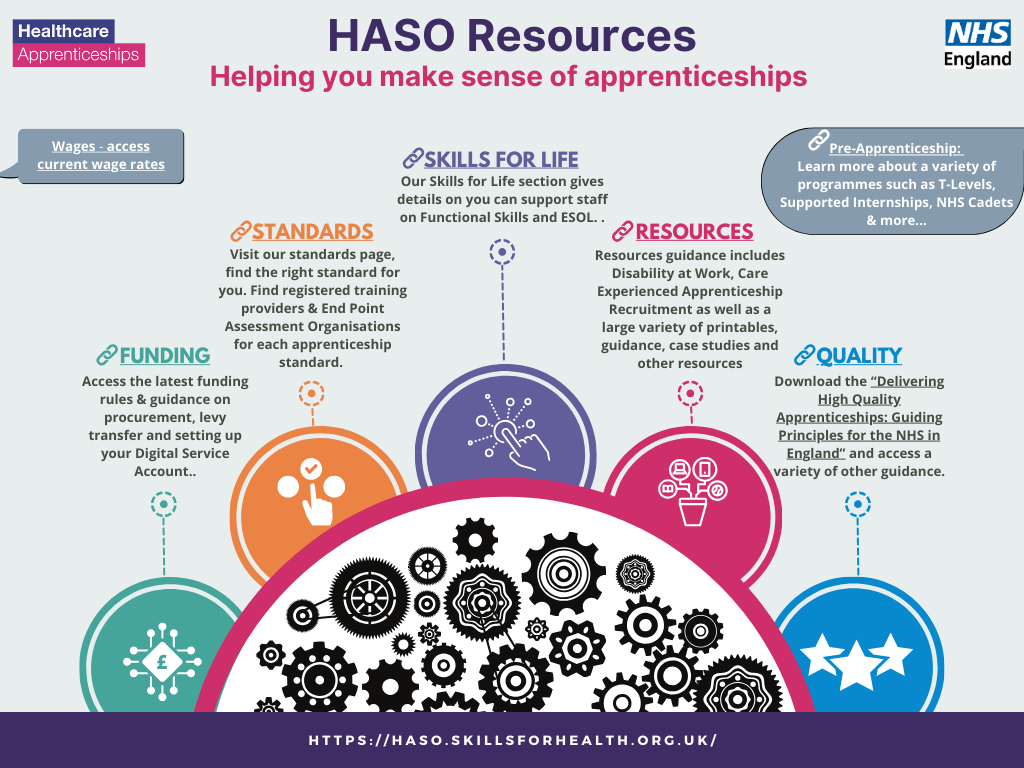Access our Growing the health sector workforce printable to read an overview in some relevant areas, or find out more below.
Nursing
Currently, only approximately 9% of nurses qualify through apprenticeships. The plan aims to work towards this ambition by expanding nursing apprenticeships so that by 2028/29, 20% of registered nurses are qualifying through this route, including 33% of learning disability nurses, 20% of adult nurses and 28% of mental health nurses.
Learn more about the Level 6 Registered Nurse – Degree (NMC 2018) apprenticeship standard.
Midwifery
The Plan sets an ambition for 5% of the annual intake for midwifery training to come through apprenticeship routes, and NHS England is supportive of this being higher in geographies where there is a need.
Learn more about Level 6 Midwife (Degree) – NMC 2019 apprenticeship standard.
Nursing Associates
The plan aims to train more nursing associates (NAs), with 5,000 NAs due to start training in 2023/24 and 2024/25. This Plan estimates a need to incrementally increase that number to 10,000-10,500 per year from 2031/32.
Learn more about the Level 5 Nursing Associate (NMC 2018) apprenticeship standard.
Doctor Degree Apprenticeships
This plan also aims to introduce medical degree apprenticeships, with pilots running in 2024/25, so that by 2031/32, 2,000 medical students will train via this route. To support this ambition the plan aims to grow medical degree apprenticeships to more than 850 by 2028/29.
Learn more about Level 7 Doctor Degree (GMC 2018) apprenticeship standard, download the Medical Doctor (Degree) apprenticeship implementation resource pack
Advanced and Enhanced Practice
The plan aims to support upskilling the workforce and offering opportunities for enhanced, advanced and consultant practice will help retain NHS staff delivering clinical care, grow the total number of senior clinical decision-makers and enable the delivery of better patient care.
Traditional career structures for healthcare professionals can be too rigid, with some staff opting to leave clinical practice because they feel they cannot progress their careers.
Level 7 Advanced Clinical Practitioner (Degree) apprenticeship standard.
Level 6 Enhanced Clinical Practitioner apprenticeship standard.
 Allied Health Professional (AHP)
Allied Health Professional (AHP)
Click on the image to discover what apprenticeship standards are approved for delivery in this area.
Education and training places for the Allied Health Professional (AHP) workforce are estimated to need to grow by 19–25% by 2030/31. This expansion would need to focus on both apprenticeship routes and traditional undergraduate courses. More than a third of AHPs could train through apprenticeships, compared to 6% now, but this would vary by professional group.
The Plan sets out the following assessment for proportion of entrants joining the AHP workforce via an apprenticeship route by 2031/32:
- at least 80% for operating department practitioners, therapeutic radiographers and podiatrists
- 25–50% for paramedics, diagnostic radiographers, occupational therapists, dietetics, prosthetists and orthotists
- up to 5% for speech and language therapists and physiotherapists.
Pharmacy
There is potential to continue expanding training via the apprenticeship route for pharmacy technicians and consideration is being given to the potential of a pharmacist degree apprenticeship.
Learn more about the Level 3 Pharmacy Technician apprenticeship standard.
Healthcare Science
Apprenticeship routes for healthcare scientists are also being made available, with 20% of training places delivered via an apprenticeship route by 2028/29 (supporting an ambition to have 40% of healthcare scientists starting their training via an apprenticeship by 2031/32).
Visit our Healthcare Science page and learn about what apprenticeship standards are approved for delivery.
Core skills and knowledge must be embedded across the wider NHS workforce to improve population health. ICSs should look to expand secondary prevention expertise by working with DHSC (Department of Health and Social Care) to increase uptake of the Level 3 Community Health and Wellbeing Worker apprenticeship standard among the frontline workforce and identify opportunities to upskill enhanced and advanced practitioners in population and public health.
Non-clinical professionals in corporate services, estates and facilities and general management expanding apprenticeship routes can help address key workforce shortages and particularly benefit those professions that historically lack a consistent route for training and career development, such as non-clinical professionals in corporate services, estates and facilities and general management.
Visit our Job Families page to learn about apprenticeship standards in a wide range of areas.
 The NHS Long Term Workforce Plan was published in June 2023.The NHS is nothing without its workforce and this plan will deliver the biggest increase in training numbers in its 75-year history.
The NHS Long Term Workforce Plan was published in June 2023.The NHS is nothing without its workforce and this plan will deliver the biggest increase in training numbers in its 75-year history.



